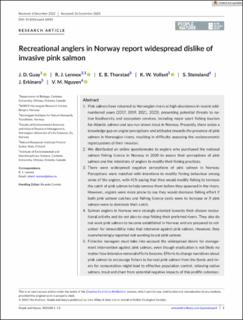| dc.contributor.author | Guay, J.D. | |
| dc.contributor.author | Lennox, Robert | |
| dc.contributor.author | Thorstad, Eva Bonsak | |
| dc.contributor.author | Vollset, Knut | |
| dc.contributor.author | Stensland, Stian | |
| dc.contributor.author | Erkinaro, J. | |
| dc.contributor.author | Nguyen, V.M. | |
| dc.coverage.spatial | Norway | en_US |
| dc.date.accessioned | 2024-02-06T09:32:58Z | |
| dc.date.available | 2024-02-06T09:32:58Z | |
| dc.date.created | 2023-12-19T10:19:00Z | |
| dc.date.issued | 2023 | |
| dc.identifier.citation | People and Nature. 2023, . | en_US |
| dc.identifier.issn | 2575-8314 | |
| dc.identifier.uri | https://hdl.handle.net/11250/3115847 | |
| dc.description.abstract | Pink salmon have returned to Norwegian rivers at high abundance in recent odd-numbered years (2017, 2019, 2021, 2023), presenting potential threats to native biodiversity and ecosystem services, including major sport fishing tourism for Atlantic salmon and sea-run brown trout in Norway. Presently, there exists a knowledge gap on angler perceptions and attitudes towards the presence of pink salmon in Norwegian rivers, resulting in difficulty assessing the socioeconomic repercussions of their invasion. We distributed an online questionnaire to anglers who purchased the national salmon fishing licence in Norway in 2020 to assess their perceptions of pink salmon and the intentions of anglers to modify their fishing practices. There were widespread negative perceptions of pink salmon in Norway. Perceptions were matched with intentions to modify fishing behaviour among some of the anglers, with 41% saying that they would modify fishing to increase the catch of pink salmon to help remove them before they spawned in the rivers. However, anglers were more prone to say they would decrease fishing effort if both pink salmon catches and fishing licence costs were to increase or if pink salmon were to dominate their catch. Salmon anglers in Norway were strongly oriented towards their chosen recreational activity and do not plan to stop fishing their preferred rivers. They also do not want pink salmon to become established in Norway and are prepared to volunteer for stewardship roles that intervene against pink salmon. However, they overwhelmingly reported not wanting to eat pink salmon. Fisheries managers must take into account the widespread desire for management intervention against pink salmon, even though eradication is not likely no matter how intensive removal efforts become. Efforts to change narratives about pink salmon to encourage fishers to harvest pink salmon from the fjords and rivers for consumption might lead to effective population control, relieving native salmon, trout and charr from potential negative impacts of this prolific colonizer. | en_US |
| dc.language.iso | eng | en_US |
| dc.rights | Navngivelse 4.0 Internasjonal | * |
| dc.rights.uri | http://creativecommons.org/licenses/by/4.0/deed.no | * |
| dc.subject | angler behaviour | en_US |
| dc.subject | angler perceptions | en_US |
| dc.subject | fisheries management | en_US |
| dc.subject | human dimensions | en_US |
| dc.subject | invasive species | en_US |
| dc.subject | recreational fishing | en_US |
| dc.subject | socioeconomic | en_US |
| dc.title | Recreational anglers in Norway report widespread dislike of invasive pink salmon | en_US |
| dc.title.alternative | Recreational anglers in Norway report widespread dislike of invasive pink salmon | en_US |
| dc.type | Peer reviewed | en_US |
| dc.type | Journal article | en_US |
| dc.description.version | publishedVersion | en_US |
| dc.rights.holder | © 2023 The Authors | en_US |
| dc.subject.nsi | VDP::Andre fiskerifag: 929 | en_US |
| dc.subject.nsi | VDP::Other fishery sciences: 929 | en_US |
| dc.source.pagenumber | 13 | en_US |
| dc.source.journal | People and Nature | en_US |
| dc.identifier.doi | 10.1002/pan3.10553 | |
| dc.identifier.cristin | 2215360 | |
| dc.relation.project | Andre: Miljødirektoratet | en_US |
| dc.relation.project | Andre: Jessika Guay's scholarship (Queen Elizabeth II Scholarship in Science and Technology (QEII-GSST)) | en_US |
| cristin.ispublished | true | |
| cristin.fulltext | original | |
| cristin.qualitycode | 1 | |

